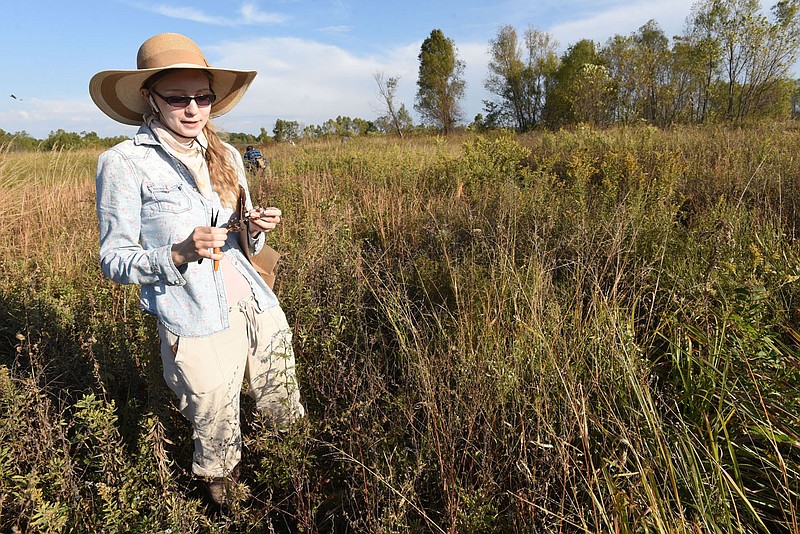FAYETTEVILLE -- Casual visitors at Woolsey Wet Prairie walk mowed trails to admire wildflowers and native plants that flourish there. Volunteers with Project Wingspan wade into the thick of it, up to their elbows in tall grass waving in the breeze.
Their goal is to collect the seeds from native plants for distribution and planting around the region. The seeds will hopefully grow into mature plants that benefit pollinators such as monarch butterflies and bees.
A platoon of Project Wingspan volunteers carefully collected seeds in October at Woosley Wet Prairie on the west edge of town. Some 25 volunteers in Northwest Arkansas are trained seed collectors in Project Wingspan, a seven-state effort to enhance habitat for pollinators in Arkansas and the Midwest states of Illinois, Indiana, Michigan, Minnesota, Ohio and Wisconsin.
Project Wingspan works hand in hand with Pollinator Partnership, a larger national effort to get more pollinator habitat in place.
Pollinators transfer pollen grains between male and female plants so they'll reproduce and produce seeds. Butterflies, birds, bees and other insects do this while searching for food, mates and shelter. Without pollination, most plants wouldn't survive.
Project Wingspan volunteers are trained to properly collect seeds at prairies and other locations, said Sarah Geurtz, who led the team of collectors in October at Woolsey.
"We collect seeds, but not all the seeds from one plant," she said. That's so the plant will survive to produce more plants like it.
In Arkansas, seeds are collected from some 25 native plant species around the state, Geurtz said. At Woolsey Wet Prairie in October, volunteers took seeds from button bush plants, narrowleaft mountainmint and foxglove beardtongue.
Native seeds collected in the seven states are shipped to a nursery in Illinois where they're processed and readied for distribution starting early in 2022, Geurtz said. City and state agencies and private landowners have applied to get seeds through the program for planting in their area.
Most applications are from state parks, land trusts and public agencies. Seeds will be given out where planting can have the maximum benefit, said Sara Wittenberg of Centerton, Arkansas coordinator for Project Wingspan.
"When you improve habitat for pollinators, it benefits all wildlife," she said. Quail, wild turkeys, deer and all kinds of birds take food or shelter from the native plants.
Winter is a good time to plant some seeds, she said. How well they grow depends a lot on site preparation. That includes taking out weeds and undesirable plants so the surface is clean for planting.
Volunteer Samantha Heller sported a wide-brimmed hat while collecting seeds under the bright autumn sun at Woolsey Wet Prairie. She's always been interested in birds, wild plants and nature.
"In training, we learn how to identify plants and how to collect seeds without hurting the plant," she said. Volunteers use hand-held loppers to take seeds and place them in a paper bag.
They hope the seeds will grow into a mature plants that host butterflies, bees and birds.

Help for pollinators
For more information about Project Wingspan and other pollinator projects, visit pollinator.org.
Source: Staff report

